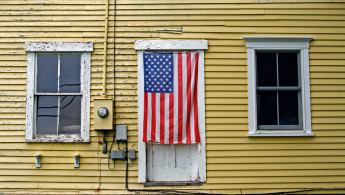Navigating Arab identity in America's racial landscape
"But on most days, the unlucky ones, this country reminds you you're too different for anywhere."
Shortly after the Syrian civil war broke, Hilal, like most of his siblings, were displaced. Hilal sought refuge in Turkey first, a country that "never accepted who I am".
After spending three years working with non-governmental organisations helping Syrian refugees, Hilal met a Syrian American researcher. A while later, they married and Hilal would soon start a new life in the US.
During our first private conversation, Hilal and I joked about being "children of the empire" and how we never realised we were brown, let alone pronouncedly Arab, until we set foot in the US.
What would later become the baseline of all our future conversations, formal niceties were cut short to a couple of minutes while hours were spent on two prevalent questions: "Who are Arabs to America and what is America to Arabs?"
Hilal, who is on a pathway from legal permanent residency to citizenship, said his struggles with identity and "where I stand in American society" bounces back and forth between being "too clear" and "too evasive."
 |
People remind you that you're different. On a lucky day, you're reminded you're not too different to be one of them |  |
On one hand, Arab immigrants like Hilal are expected to assimilate to a white American standard. On the other hand, they're expected to enjoy and build on the freedom American society provides. For Hilal, when those hands clap, the rhythm of the Arab American experience brings both wonder and confusion.
Arab American civic society is a source of hope for Hilal but he knows a "greater political elevation and engagement" still aren't enough, adding that participation in US politics without acknowledging the hyper-intensity of racial dynamics is "like holding onto an already slippery object with a sweaty grip."
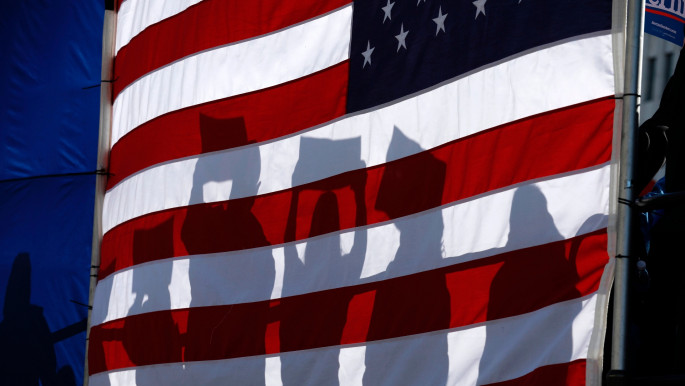 |
|
| Read more: Young Arab American voters aren't the monolithic bloc the US thinks they are |
During the countdown to Election Day, Arab Americans, estimated to number around 3.5 million people, proved on multiple political occasions that they are not a faction independent of US politics.
With a strong presence capable of flipping a vote red or blue in several swing states, Arab Americans not only showed up with a grand sense of civic duty but were also politically courted rather than suffer the usual dismissal. Voter engagement was higher and younger for Arab Americans than in any previous US presidential race.
Indeed, this election year provides a jumping point for Arab Americans as "a cataclysmic moment for progress that the Arab story is inseparable from the American story," Hilal said.
Though hopeful and excited for the future, Hilal believes Arab Americans haven't confronted their questionable place in US society, where race is ubiquitous yet "largely ignored" by many in the community, he said.
The first person Hilal could openly talk with about his "brown self in the white gaze" was his late brother-in-law, Ahmed. I first met Ahmed when we were both undergraduate students in Boulder, Colorado. After eyeing each other for a while in the university's gym, both of us suspecting the other was Arab, Ahmed greeted me in Arabic.
 |
Arab immigrants are expected to assimilate to a white American standard. On the other hand, they're expected to enjoy and build on the freedom American society provides |  |
He said he'd suspected I was Indian because of my darker skin while I had thought he was white. Like my conversations with Hilal, Ahmed and I mostly commiserated. We talked about our academic experiences of either having to be ambassadors of all things Arab or defenders of all things Arab.
In one conversation, after joking about his white passing looks, Ahmed, who is of Palestinian and Syrian descent, said the lack of openness by the Arab American community at large when it comes to race hurts him on a personal level. When dealing with white Americans, he once told me "you can often just see it in a person's eyes when we exchange names, I go from white to terrorist in a second."
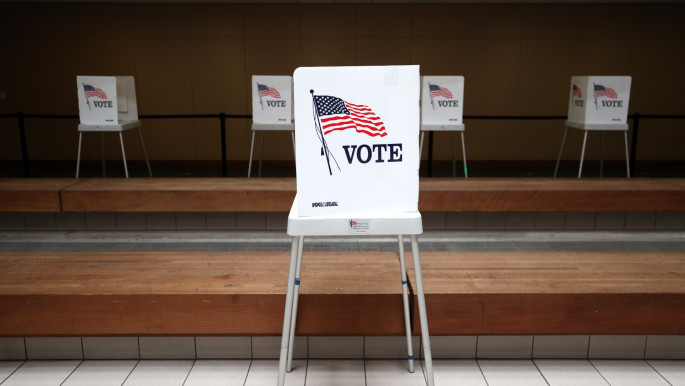 |
|
| Read more: The Arab and Muslim candidates fighting to transform American politics |
Ahmed, who was born and raised in New York, said his interactions with other "less Americanised" Arabs echoed the same alienation. Across the university, in a commercial strip dubbed by students as "the Hill," were two Palestinian American markets.
Ahmed once recalled that when he would go for a falafel sandwich to one of those markets, the darker-skinned Arab Americans who work there often mistook him for a white person despite Ahmed's fluency in Arabic – a scenario, he said, that reminded him how puzzling US race relations are to the average Arab American.
 |
You can often just see it in a person's eyes when we exchange names, I go from white to terrorist in a second |  |
Despite his white-passing skin and power-adjacent socio-economic background, Hilal said his late brother-in-law "suffered a lot in trying to remove himself from whiteness. He reached a point where that's all he could talk about."
Hilal, whose skin is darker than Ahmed's and who often keeps his beard long, said his bond with Ahmed kept him "in check whenever I encountered racism or was mistreated by someone."
An analysis of census microdata conducted by the LA Times in 2015 found that over 80 percent of Arab Americans have identified as white. However, Arabs identifying as white by choice also clashes with the muddy waters of the US Census, where there is no choice other than white for people from the Middle East and North Africa.
During Donald Trump's presidency, one that has fuelled racism and one that signals white nationalists to "stand back and standby," the US political scene reflects clearly what is for many at the heart of US society: white supremacy.
Along with their internal race related problems, Arab Americans can't identify as anything but white on a federal level – and for people like Hilal and Ahmed, or a Yemeni American or an Afro-Arab American, little hope lies in engaging with a political system that both erases them and amplifies their struggles.
"The more he grew aware of how we exist in this country, the more he became tormented by it," Hilal said of Ahmed, who died in a car accident in late 2016.
Yousif Amra, whose family owned both Palestinian American markets on the Hill across from the University of Colorado in Boulder, also went to the same university with Ahmed and I. One day, I found Amra, a white passing Arab American who now serves as an engineer with the US Marine Corps, consoling Mohammed, a Sudanese American deli cook outside his family's shop.
Amra was apologising on behalf of Mohammed's co-workers for their repeated, casual use of the n-word. The co-workers, Amra's Palestinian American cousins, were also harassing Mohammed with racist jokes. When Amra went inside to confront his cousins, Mohammed sat outside crying.
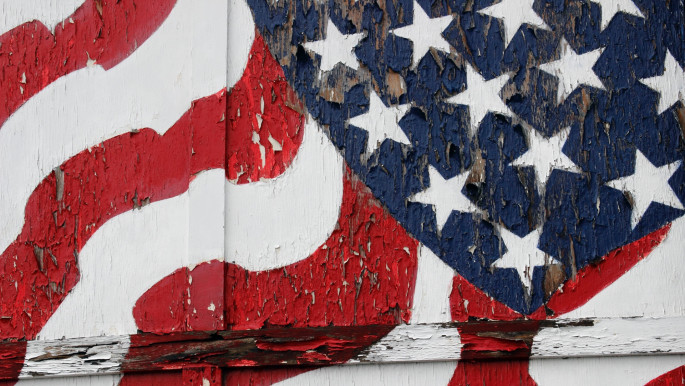 |
|
| Read more: The long fight for MENA recognition in the US census |
While covering the exclusion of a race category for Arab Americans in the census, Asha Noor, a Somali American racial justice and human rights activist, told The New Arab that black or Afro-Arabs bear the brunt of bigotry against Arab and Muslim Americans. From abusive surveillance to lack of recognition, Noor said, black people in the US from all ethnicities suffer the most.
Inside the Arab American community, colourism and anti-blackness are also ugly attributes that complicate the shaky ground Arabs occupy in US society.
Years before she called the police on George Floyd, who was killed outside the Arab-owned Holy Land market in Minneapolis, Minnesota, Lianne Wadi had posted an Instagram picture of herself holding a monkey with the caption: "made friends with this little n*gga today."
Hilal said class and how Arab communities made their way to the US play a role in internal discrimination as well. If in doubt, he sarcastically said, "imagine how people would talk if your 'fresh off the boat' shawarma cutter makes it to office in place of someone like Darrel Issa," an Arab American Republican politician.
 |
Inside the Arab American community, colourism and anti-blackness are ugly attributes that complicate the shaky ground Arabs occupy in US society |  |
Hilal's sarcasm, although harsh, rings true with Lebanese American Ibtihal Makki, who said her Michigan neighbourhood was filled with white-passing Arabs. When her street saw a rise in Yemeni homeowners and tenants, some of whom are refugees, she said, there was "a Lebanese flight instead of a white flight when black people move into their neighbourhoods."
For Kimball Brace, president of Election Data Services and census expert, class and race are usual markers when districts are politically redrawn in favour of either Democrats or Republicans.
Presented with a hypothetical situation in a district where Arab neighbourhoods are situated in majority white districts and how they would be possibly redrawn, Brace said "depending on the political party in charge of drawing it, people of colour get lumped up to what serves those in power."
So regardless of Makki's neighbourhood mix of different Arabs from different socio-economic backgrounds, politically their place serves a purpose that often doesn't serve them – leaving them as a group that is adjacent to power but essentially powerless.
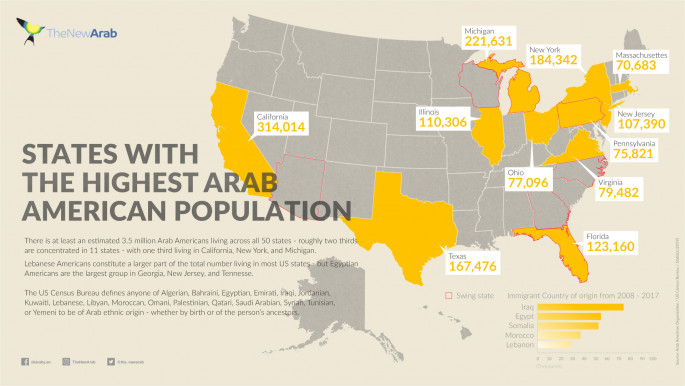 |
|
| Click to enlarge |
When it comes to the census dilemma, Samer Khalaf, the president of the Arab American Anti-Discrimination Committee, called the exclusion from the census "extremist and supremacist."
Ultimately, he said, the census accumulates Arabs and people ethnically or racially from the Middle East and North Africa to the white category, keeping this demographic as a majority.
The census allocates federal funding and congressional representation, but for Arab Americans, it neither directly nor indirectly caters to their needs the way Arab American numbers cater to the needs of the white category.
Khalaf also said the addition of a racial category permitting Arab Americans to move away from the white category was near certain until a last-minute Trump administration change. Despite the aggression Arab Americans face from presidential decisions like that, over a third of Arab Americans aimed to vote for Donald Trump.
For Hilal, Arabs who voted for Trump or those who "wilfully act on behalf of whiteness against the community" are "Ammu Tom," a pun on the Uncle Tom term, and are "too oblivious being soldiers of a supremacist regime to even stop and think about it." In one conversation, he asked: "What was the most difficult interview you've conducted so far?"
In 2017, while working on an article that profiled Arab American and white soldiers deployed to Iraq and the Middle East together, I shadowed former US Army Ranger Colin Jandt. Suffering from acute PTSD caused by an explosive device in Syria that blew up right beneath him while driving a military vehicle, Jandt's behaviour was quite disturbing.
 |
Class and how different Arab communities made their way to the US play an important role in internal discrimination |  |
In the middle of conversations, Jandt would stop and ask me where the "ragheads" are and repeatedly said "sandn*gger" in conversation, referring both to myself and the Arab combatants he faced.
On the other hand, while interviewing Nate Landry, also a former marine who served with Arab American soldiers, the commentary was worse than dehumanising words. When asked if he ever killed anyone during military combat, Landy said "yes, many."
At first, Landry said he never thought he could take a life, especially because "our teammates looked a lot like the ones who were shooting at us," he said. Though when it came time for combat, "all the voices that tell you this person is less than you start to kick in."
Hilal wasn't shocked, Landry and Jandt's stories were only confirmations to how Arab Americans can be seen in extreme cases – white when they are useful.
When asked if his military training involved the dehumanisation of other people, Amra said no, but added "there's a reason I signed up as an engineer and not a combat engineer. I needed an education", not killing for America.
Yousef H. Alshammari is a US-based Kuwaiti journalist and writer with a focus on international politics and culture.
Follow him on Twitter: @YousefWryRonin
